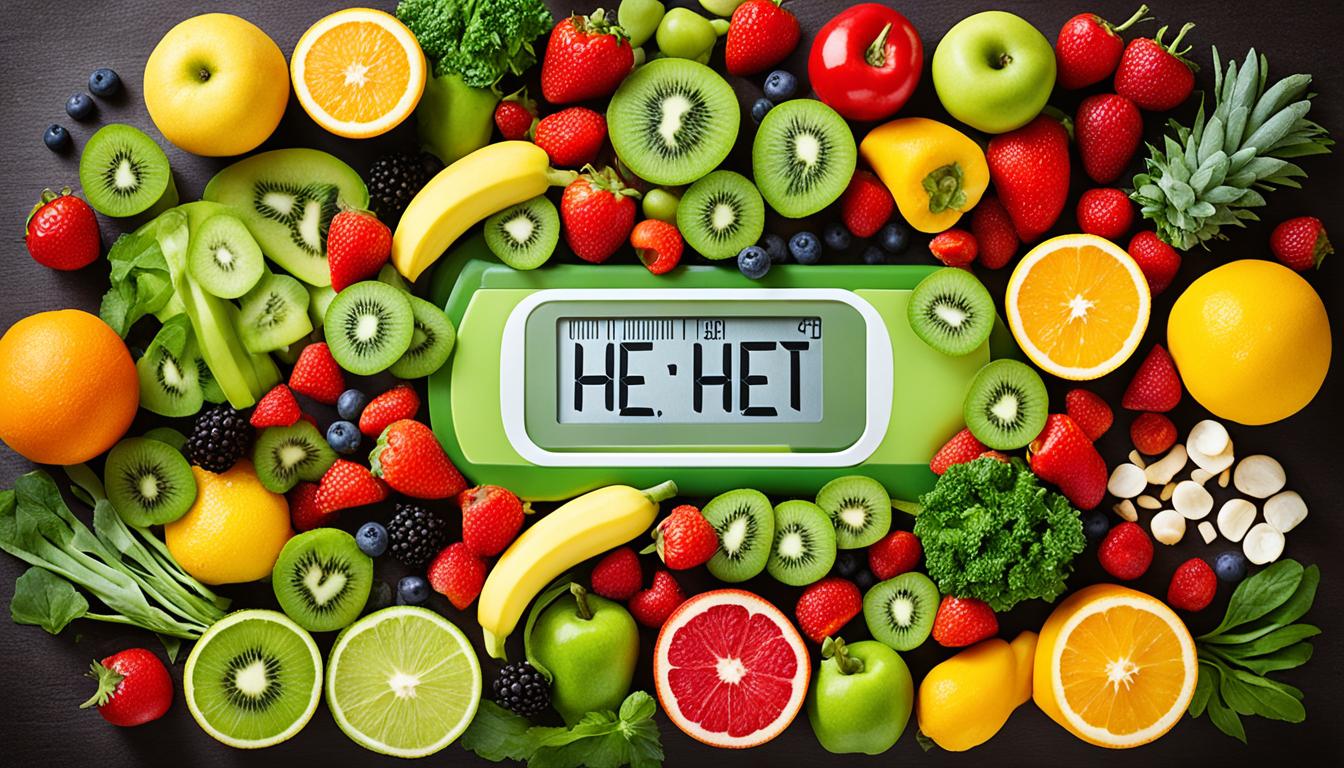In today’s fast-paced world, getting healthy can feel tough. That’s where expert nutritional tips for weight loss come in. By focusing on what to eat, you can take steps towards a balanced diet that fits your wellness goals. These tips not only help with losing weight but also improve your health for the long run.
This article will show you simple yet powerful changes for your daily life. We’ll focus on healthy eating habits to make meals that are good for you. Join us as we work towards a healthier, happier you!
Key Takeaways
- Expert nutritional tips can streamline your weight loss journey.
- Understand the importance of a balanced diet for overall wellness.
- Incorporating practical healthy eating habits is essential for success.
- Focus on sustainable changes rather than quick fixes.
- Explore nutrient-dense foods that promote satiety and health.
Understanding Weight Loss Nutrition
Weight loss nutrition is key to a healthier life. It helps people make smart food choices. A big part is about getting a caloric deficit, which is vital for losing weight.
The Science of Caloric Deficit
To get a caloric deficit, you need to eat less than your body burns. First, figure out your metabolic rate and how much energy you use daily. Keep track of how many calories you eat and how active you are to spot patterns and make changes.
By eating fewer calories, your body will start to use stored fat for energy. This is a key part of effective weight loss nutrition.
Importance of Macronutrients
Macronutrients like proteins, carbs, and fats are crucial for losing weight. They help with health and energy. Proteins help keep muscles strong and make you feel full. Carbs give you energy, and fats are important for making hormones and absorbing nutrients.
It’s important to get the right balance of these nutrients based on your needs, likes, and how active you are.
Balancing Carbohydrates, Proteins, and Fats
Getting the right mix of macronutrients keeps your energy up and helps you feel full. Experts say eating a variety of foods is best for getting all the nutrients you need. Eating whole grains, lean proteins, and healthy fats supports weight loss and long-term health.
Choosing balanced meals helps you keep the weight off and prevents gaining it back.
Nutritional Tips for Weight Loss
Choosing the right foods can really help with weight loss. Learning to pick high-protein, fiber-rich, and whole foods is key. These choices can change how you eat and improve your health.
Incorporating High-Protein Foods
Adding high-protein foods to your meals can make you feel full and support weight loss. Foods like chicken, fish, beans, and legumes are great picks. They give you important nutrients and help you avoid unhealthy snacking.
Emphasizing Fiber-Rich Options
Foods high in fiber keep you feeling full and support your digestive health. Eating whole grains, fruits, vegetables, and legumes helps control hunger. These foods add bulk to your meals and release energy slowly, making them great for weight loss.
Selecting Whole Foods Over Processed Choices
Going for whole foods over processed ones boosts your diet’s quality. Whole foods are usually lower in calories and full of vitamins and minerals. They don’t have unhealthy additives. Focus on fresh fruits, vegetables, lean proteins, and whole grains for meals that help with weight loss.
Healthy Eating Tips for Optimal Wellness
Eating healthy is key to feeling good overall. Adding simple steps to your daily life can make eating better and more enjoyable. Drinking enough water and eating mindfully can greatly improve your health.
The Role of Hydration
Drinking enough water is vital for your health. It helps with metabolism, digestion, and controlling hunger. It also boosts energy and keeps you focused. Try to drink at least eight 8-ounce glasses of water every day.
Here are some tips to stay hydrated:
- Carry a reusable water bottle to encourage regular sips.
- Infuse water with fruits or herbs for added flavor.
- Set reminders to drink water throughout the day.
Mindful Eating Practices
Practicing mindful eating can change how you see food. It helps you notice when you’re hungry, how much you’re eating, and what you’re eating. This leads to enjoying meals more and eating less.
Here are some tips for eating better:
- Eat slowly to savor each bite.
- Prioritize whole foods with high nutritional value.
- Limit distractions during meals, such as screens or multitasking.
Dieting Tips and Tricks for Sustainable Weight Management
Starting a weight loss journey takes dedication and smart strategies. Using effective dieting tips can help you manage your weight for the long term. Strategies like setting realistic goals, tracking your progress, and finding healthy food substitutes can really help you succeed.
Setting Realistic Goals
It’s key to set realistic goals for weight loss. Go for specific, achievable targets that focus on slow progress. Losing 1-2 pounds a week is a good pace. This keeps you motivated and helps you stay positive, which is important for keeping weight off.
Tracking Your Progress
Keeping track of your progress is vital for dieting success. Use a food diary or apps to log your meals and workouts. This gives you insights into your habits. It lets you make smart changes to your diet and celebrate your successes.
Finding Healthy Substitutes for Favorite Foods
Switching to healthier foods can be fun with a bit of creativity. Try healthy substitutes for your favorite foods, like whole grains instead of refined ones. Choose Greek yogurt over sour cream or zoodles instead of pasta. These changes make your meals better and help with weight management.
Conclusion
The path to better weight management is closely linked to the nutrition advice shared here. It’s important to understand the science behind losing weight and the role of different nutrients. This knowledge helps anyone looking to get healthier.
It’s key to eat foods high in protein, fiber, and whole foods. These foods support weight loss and boost overall health. By following these diet tips, you can work towards your health goals.
Remember, changing your eating habits takes time and effort. Be patient and keep making healthy choices for lasting results. Having a strong support system can also help you stay on track.
Your health journey is a continuous process. Every step you take towards eating better and living mindfully helps your health. Keep exploring your nutrition options and you’ll see improvements in your weight and overall well-being over time.



